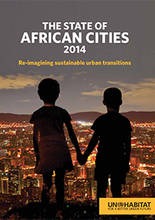Location
UN-Habitat is the United Nations programme working towards a better urban future.
Its mission is to promote socially and environmentally sustainable human settlements development and the achievement of adequate shelter for all. Cities are facing unprecedented demographic, environmental, economic, social and spatial challenges. There has been a phenomenal shift towards urbanization, with 6 out of every 10 people in the world expected to reside in urban areas by 2030. Over 90 per cent of this growth will take place in Africa, Asia, Latin America, and the Caribbean. In the absence of effective urban planning, the consequences of this rapid urbanization will be dramatic. In many places around the world, the effects can already be felt: lack of proper housing and growth of slums, inadequate and out-dated infrastructure – be it roads, public transport, water, sanitation, or electricity – escalating poverty and unemployment, safety and crime problems, pollution and health issues, as well as poorly managed natural or man-made disasters and other catastrophes due to the effects of climate change. Mindsets, policies, and approaches towards urbanization need to change in order for the growth of cities and urban areas to be turned into opportunities that will leave nobody behind. UN-Habitat, the United Nations programme for human settlements, is at the helm of that change, assuming a natural leadership and catalytic role in urban matters. Mandated by the UN General Assembly in 1978 to address the issues of urban growth, it is a knowledgeable institution on urban development processes, and understands the aspirations of cities and their residents. For close to forty years, UN-Habitat has been working in human settlements throughout the world, focusing on building a brighter future for villages, towns, and cities of all sizes. Because of these four decades of extensive experience, from the highest levels of policy to a range of specific technical issues, UN-Habitat has gained a unique and a universally acknowledged expertise in all things urban. This has placed UN-Habitat in the best position to provide answers and achievable solutions to the current challenges faced by our cities. UN-Habitat is capitalizing on its experience and position to work with partners in order to formulate the urban vision of tomorrow. It works to ensure that cities become inclusive and affordable drivers of economic growth and social development.
Members:
Resources
Displaying 121 - 125 of 224Regional Learning Workshop on Land and Natural Resources Tenure Security in East and Southern Africa Final Proceedings, 30 June - 2 July 2015, Nairobi, Kenya
This publication is the summary of the proceedings of the Regional Learning Workshop on ‘Land and Natural Resources Tenure Security’ held in Nairobi, Kenya from 30th June -2nd July 2015 as jointly organized by UN-Habitat/Global Land Tool Network and International Fund for Agricultural Development (IFAD).
Law, Land Tenure and Gender Review Series
This report was commissioned by UN-Habitat to review the laws and land tenure of a selected number of southern African countries. It involved the appointment of country specialists who researched and produced country chapters for their respective countries namely, Lesotho, Mozambique, Namibia and Zambia. A regional expert was appointed to produce a regional overview to serve as a source document for the country reports, as well as provide overall coordination of the project. The project was carried out over a period of roughly one year, which began in March 2004.
Lesotho housing profile
The formal private sector in Lesotho concentrates on housing at the very top of the market leaving the majority unserved by formal housing supply.
Applications of the Voluntary Guidelines on the Responsible Governance of Tenure of Land, Fisheries and Forests in the Context of National Food Security (VGGT) in Urban and Peri-Urban Areas
This study aims to assess the applicability of the Voluntary Guidelines on the Responsible Governance of Tenure of Land, Fisheries and Forest in the Context of National Food Security (VGGT) in urban and peri-urban areas. The study also aims to facilitate decision-making on the next steps needed to ensure the application of the VGGT in urban and peri-urban areas, including informing the implementers on how they can anchor the VGGT in their activities, i.e. to apply or use the VGGT in their work in urban and peri-urban areas.
State of African Cities 2014: Re-imagining sustainable urban transitions
The African continent is currently in the midst of simultaneously unfolding and highly significant demographic, economic, technological, environmental, urban and socio-political transitions. Africa’s economic performance is promising, with booming cities supporting growing middle classes and creating sizable consumer markets. But despite significant overall growth, not all of Africa performs well. The continent continues to suffer under very rapid urban growth accompanied by massive urban poverty and many other social problems.



